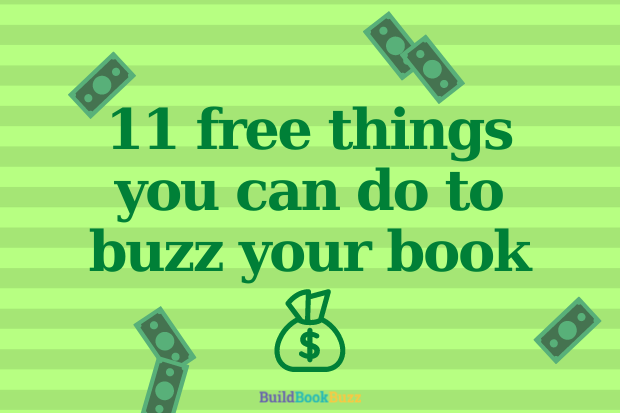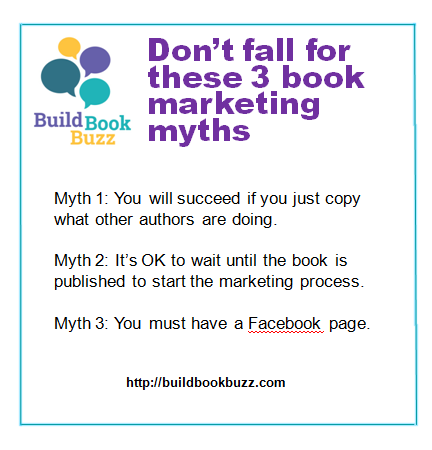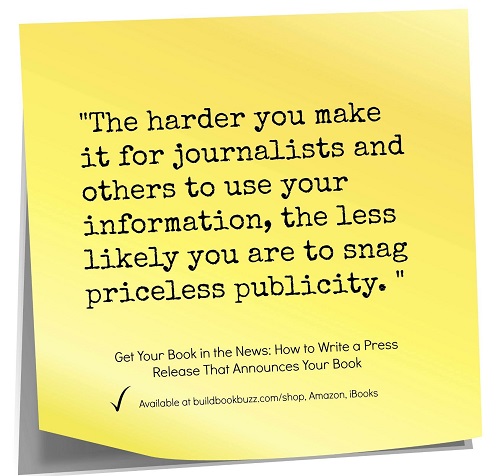11 free things you can do to buzz your book
After paying for a snazzy cover design, editing, and proofreading, self-published authors don’t always have a lot of money for book marketing and promotion.
And many traditionally published authors aren’t earning the advances they used to, either. In the past, they could invest those funds in marketing. Now? Not so much.
Still, there’s a lot you can do to buzz your book that won’t cost you anything but time – and not much of that, either!
Here are 11 ideas to get you started.
1. Create a holiday linked to your book’s topic.
Submit it for publication in “Chase’s Calendar of Events.” Promote it each year with a press release announcing how you and others are celebrating the occasion.
One of my favorite examples is parenting author’s Jen Singer’s “Please Take My Children to Work Day.”
Jen created this years ago when her sons were little. She got a lot of mileage out of this clever twist on an old favorite because she promoted it so well.
2. Become a podcast guest.
Podcasts are basically web-based audio programs built around specific topics, from health and wellness to books and true crime. No matter how niche or esoteric your topic or expertise, you’ll probably be able to find a podcast for it.
Search for podcasts about your topic, then review each program’s website to see if it uses guests. After you narrow down your list to those that do, listen to several episodes of each so you’re familiar with each show’s content and how it’s presented.
Before emailing the producer or host to offer yourself as a guest, Google “how to pitch podcasts” so you’re aware of best practices.
3. Comment on blogs.
Set up a Google Alert for your topic so you know when others are talking about it online.
When you comment on a blog post, provide value in a non-promotional way. You can include your book title in your signature; most blogging platforms ask you to provide a URL in the comment form.
For more on how to comment effectively, read “How to comment on blogs.”
4. Write an op-ed or essay linked to your book’s topic.
An op-ed is an opinion article that typically advocates or educates. Because they’re opinion pieces with a stated bias rather than reported stories, they go in a section of the newspaper that’s set aside for opinions. This is usually alongside the letters to the editor.
Essays are first-person narratives that don’t necessarily express an opinion or try to influence readers. Magazines and online media outlets publish them; some radio stations accept audio versions.
To leverage the op-ed option, you often have to wait for a significant local or national news story that provides the timely hook you need to submit your opinion piece.
After paying for a snazzy cover design, editing, and proofreading, self-published authors don't always have a lot of money for book marketing. Still, there’s a lot you can do to buzz your book. Here are 11 ideas to get you started.Tweet it!For that reason, and because news stories can disappear quickly, I generally recommend that you pre-write one or two op-eds related to your topic so you can get them to the editorial page editor quickly, before the topic disappears.
Novelists, please don’t dismiss this as a nonfiction-only tactic. For example, romance writers could have leveraged the recent Bill and Melinda Gates divorce announcement by writing essays about:
- Why am I so sad about the Bill and Melinda Gates divorce?
- Will my marriage end up like Bill and Melinda Gates’s?
- Can money buy love?
Get op-ed writing tips in “How to write an op-ed column or essay.”
5. Create “tipographics.”
Tipographics — tip lists in an image that can be shared — are an especially good fit for nonfiction authors.
Here’s how I use this tactic:
- I created a branded master template in PowerPoint, but you can use Canva or any other design program you’re comfortable with.
- I turn the key points from a blog post into an image with a title and the list of tips.
- I add them to a Pinterest board as I create them. Each image links back to the original blog post with more specific information. Here’s one example:
Don’t limit use to Pinterest, though. Share them on any social network where you’re active.
6. Do a newsletter swap.
With a newsletter swap, you and another author agree to promote each other’s books in your email newsletters.
Finding authors who reach your target audience and have a newsletter will take a little effort (what doesn’t?) if you aren’t already connected to authors in your genre or category, but it’s doable.
Alternatively, offer to write articles for their newsletters.
Learn more about this tactic in “How to do an author newsletter swap.”
7. Create quote graphics from your book’s text.
What pithy gems can you pull from your book for a social media image?
If you write fiction, you might use your opening sentence or a snippet of dialogue. There are no rules other than using a small amount of text that might intrigue your ideal readers.
Nonfiction writers might pull out an “aha!” that offers a miniscule preview of what readers will learn.
Here’s how I did it for one of my books.
8. Compile your own media distribution list so you don’t have to pay a distribution service.
Use a combination of directories and your own online research to develop an e-mail list for the media outlets that will be interested in information related to your book’s topic.
This approach works best if you’re targeting local media only, or focusing on a specific publication category — for example, parenting or packaging industry publications.
Learn how to do it in “How to build a killer book publicity media list.”
9. Ask a blogger to do a Q&A with you.
When you do this properly, it’s a win-win for you and the blogger.
You will reach more of your ideal readers by leveraging your host’s audience.
And, when you share the link to your Q&A on the social networks where you’re active and in your newsletter, you’ll bring that blogger more readers, too.
10. Write and distribute a tip sheet.
A tip sheet is a news release that offers tips or advice in a bulleted or numbered format.
It is one of my favorite book promotion media relations tools because it’s so effective as a feature or segment starter and as filler material.
Learn how to write one and see an example in, “How to create a book publicity tip sheet.”
11. Create and share short videos.
I’m not suggesting you start writing, directing, and producing video short stories — far from it.
Instead, if you write fiction, create a series of short videos that answer questions about your book. Topics might include:
- What inspired the story?
- Why did you select the setting you used?
- What’s your thinking behind your characters’ names?
Nonfiction authors might create videos that:
- Show how to do something
- Answer frequently asked questions from readers or your target audience
- Interview others about your topic
More and more of us are watching videos for information or entertainment. Why not take advantage of its popularity?
Need more ideas? Get additional inspiration in “10 free book promotion ideas.”
What’s the best free tactic you’ve used to buzz your book?
(Editor’s note: This article was first published in November 2011. It has been updated and expanded.)
Like what you’re reading? Get it delivered to your inbox every week by subscribing to the free Build Book Buzz newsletter. You’ll also get my free “Top 5 Free Book Promotion Resources” cheat sheet immediately!




Really enjoyed your tips. As a fiction author it is hard to find useful ideas on what to blog and how to promote yourself and novels. Thanks, your ideas where refreshing and thought generating. – Kay
Thanks, Kay! I’m glad you found these ideas helpful.
Sandy
This issue held a wealth of information for us indie authors. Thank you.
I’m glad it was helpful, Don. Thanks for letting me know.
Sandy
All excellent ideas! I am now on fire appearing on podcasts and hope that the strategy will help me gain new readers from a variety of audiences. But thrilled to hear about the op-ed. I was pondering if it would be a good move for me. As always, your advice is golden and timely!
Sonia, I think you’ll find lots of opportunities for op-ed placements for your topic. You could also use the Gates divorce as the springboard for a tip sheet on how to select a divorce attorney. The WSJ ran an article on Monday about Melinda’s divorce attorneys — don’t you wonder why she selected the firms she did? From there, segue to “Your situation is going to be different, so what questions should YOU ask? Here are X of them….”
Sandy
Love it! Thanks! Yes, Bill and Melinda Gates’ divorce has been the greatest idea generator since “Marriage Story” came out.
It can feed your podcast pitches, too!
Sandy
Thank you so much for these tips. My dad passed from ALS last year and I wrote my first book. These tips will help Unbelievable Grief, Incredible Grace reach the hearts of those it can help. Thank you.
I’m sorry for your loss. You’re welcome.
Sandy